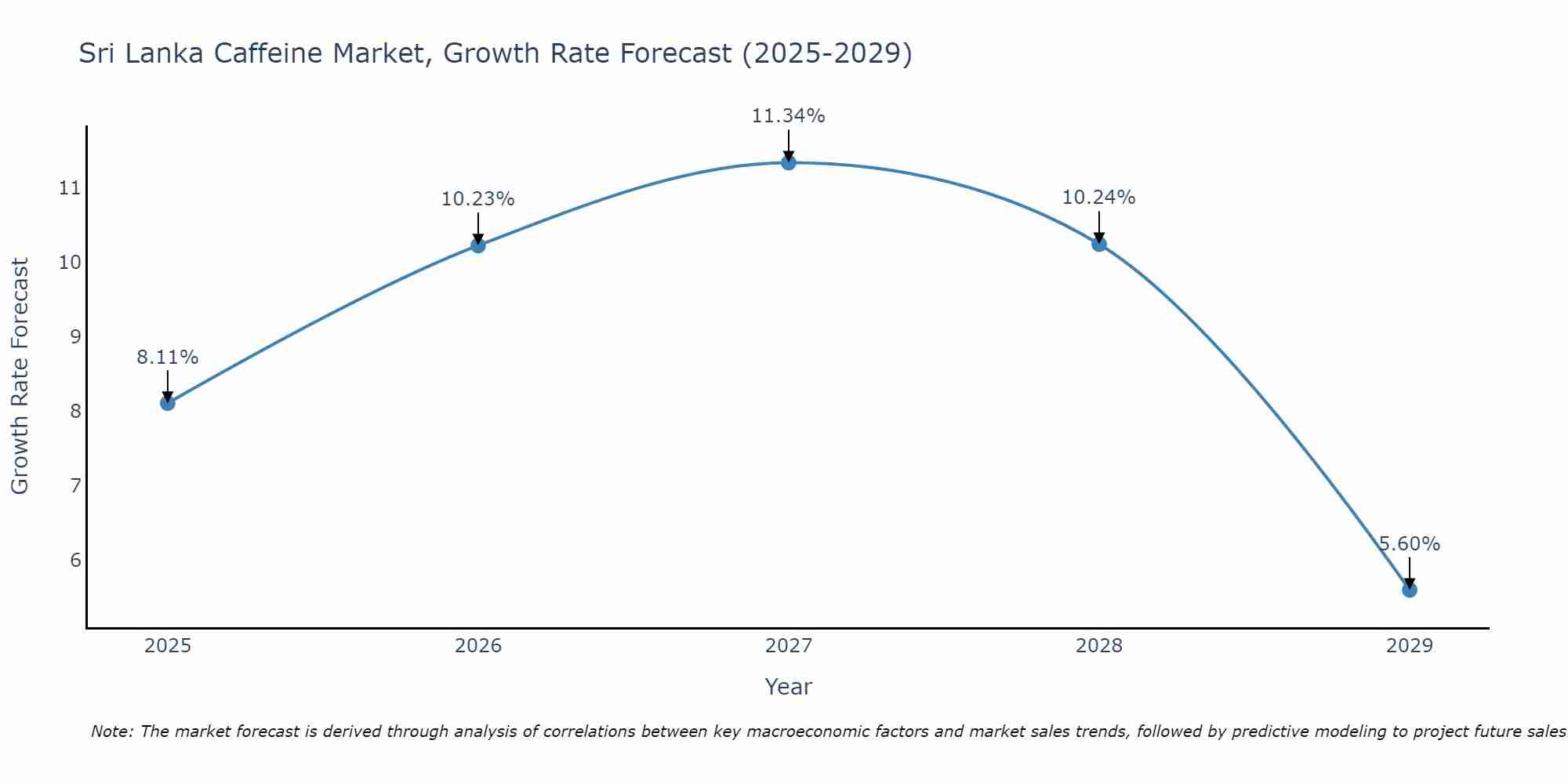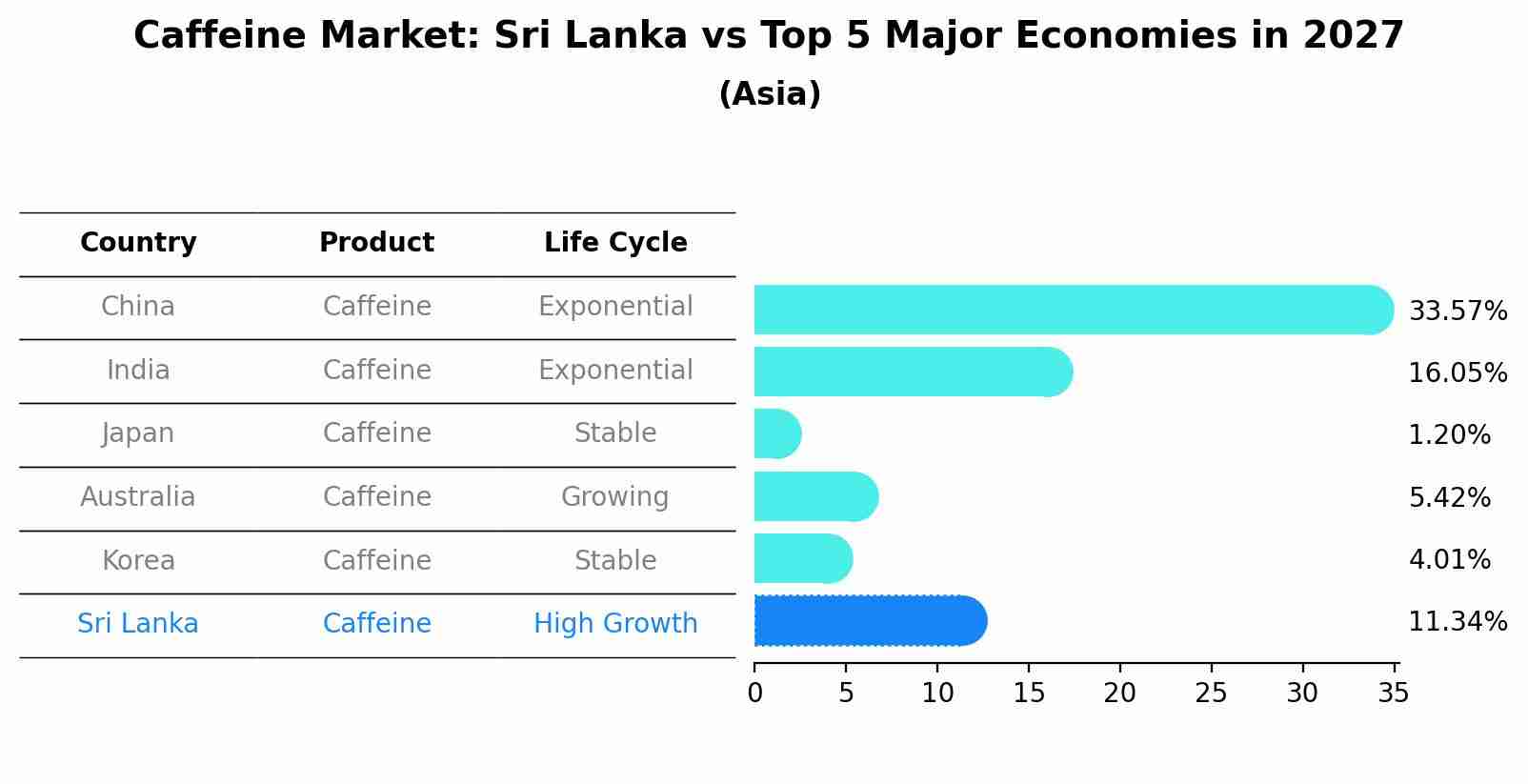Sri Lanka Caffeine Market (2025-2031) Outlook | Companies, Trends, Analysis, Size, Share, Growth, Industry, Value, Forecast & Revenue
| Product Code: ETC110030 | Publication Date: Jun 2021 | Updated Date: Apr 2025 | Product Type: Report | |
| Publisher: 6Wresearch | Author: Ravi Bhandari | No. of Pages: 70 | No. of Figures: 35 | No. of Tables: 5 |
Sri Lanka Caffeine Market Size Growth Rate
The Sri Lanka Caffeine Market is projected to witness mixed growth rate patterns during 2025 to 2029. The growth rate begins at 8.11% in 2025, climbs to a high of 11.34% in 2027, and moderates to 5.60% by 2029.

Caffeine Market: Sri Lanka vs Top 5 Major Economies in 2027 (Asia)
By 2027, the Caffeine market in Sri Lanka is anticipated to reach a growth rate of 11.34%, as part of an increasingly competitive Asia region, where China remains at the forefront, supported by India, Japan, Australia and South Korea, driving innovations and market adoption across sectors.

Sri Lanka Caffeine Market Overview
Sri Lanka caffeine market is witnessing significant growth, primarily fueled by the rising consumption of caffeinated beverages such as coffee, tea, and energy drinks. The country`s rich tradition in tea production, combined with an increasing trend towards coffee consumption, is contributing to this growth. Additionally, the demand for caffeine-based dietary supplements and pharmaceuticals is on the rise, driven by increasing health awareness and the pursuit of active lifestyles. Market players are focusing on innovation and product diversification to cater to the varied preferences of consumers.
Drivers of the market
The Sri Lanka caffeine market is primarily driven by the growing consumption of caffeinated beverages, such as tea and coffee, which are deeply embedded in the local culture. The rise in health consciousness among consumers is also propelling the demand for caffeine as an ingredient in various energy drinks and dietary supplements. Additionally, the increasing popularity of functional foods and beverages that promise enhanced physical and mental performance is further fueling market growth. The expansion of the food and beverage industry, coupled with advancements in extraction and production technologies, ensures a steady supply of caffeine to meet the rising demand.
Challenges of the market
The caffeine market in Sri Lanka encounters several challenges, primarily due to the increasing health concerns associated with caffeine consumption. Rising awareness about the negative effects of excessive caffeine intake, such as anxiety and insomnia, has led to a shift in consumer preferences towards healthier alternatives. Additionally, the market faces stiff competition from the growing herbal and natural energy drink segments. Regulatory scrutiny regarding caffeine content in beverages and dietary supplements further complicates the market, requiring stringent quality control and compliance measures.
Government Policy of the market
Government policies in Sri Lanka regarding the caffeine market are closely tied to the regulation of the food and beverage industry. The government ensures stringent quality control measures and safety standards for caffeine-containing products, including energy drinks, pharmaceuticals, and dietary supplements. Regulatory frameworks also address labeling requirements and maximum allowable limits of caffeine in consumables. The Ministry of Health plays a pivotal role in monitoring and regulating caffeine products to safeguard public health.
Key Highlights of the Report:
- Sri Lanka Caffeine Market Outlook
- Market Size of Sri Lanka Caffeine Market, 2024
- Forecast of Sri Lanka Caffeine Market, 2031
- Historical Data and Forecast of Sri Lanka Caffeine Revenues & Volume for the Period 2021-2031
- Sri Lanka Caffeine Market Trend Evolution
- Sri Lanka Caffeine Market Drivers and Challenges
- Sri Lanka Caffeine Price Trends
- Sri Lanka Caffeine Porter's Five Forces
- Sri Lanka Caffeine Industry Life Cycle
- Historical Data and Forecast of Sri Lanka Caffeine Market Revenues & Volume By Type for the Period 2021-2031
- Historical Data and Forecast of Sri Lanka Caffeine Market Revenues & Volume By Natural Caffeine for the Period 2021-2031
- Historical Data and Forecast of Sri Lanka Caffeine Market Revenues & Volume By Synthetic Caffeine for the Period 2021-2031
- Historical Data and Forecast of Sri Lanka Caffeine Market Revenues & Volume By Applications for the Period 2021-2031
- Historical Data and Forecast of Sri Lanka Caffeine Market Revenues & Volume By Pharmaceuticals for the Period 2021-2031
- Historical Data and Forecast of Sri Lanka Caffeine Market Revenues & Volume By Food for the Period 2021-2031
- Historical Data and Forecast of Sri Lanka Caffeine Market Revenues & Volume By Beverages for the Period 2021-2031
- Historical Data and Forecast of Sri Lanka Caffeine Market Revenues & Volume By Flavours and Fragrances for the Period 2021-2031
- Sri Lanka Caffeine Import Export Trade Statistics
- Market Opportunity Assessment By Type
- Market Opportunity Assessment By Applications
- Sri Lanka Caffeine Top Companies Market Share
- Sri Lanka Caffeine Competitive Benchmarking By Technical and Operational Parameters
- Sri Lanka Caffeine Company Profiles
- Sri Lanka Caffeine Key Strategic Recommendations
Frequently Asked Questions About the Market Study (FAQs):
Export potential assessment - trade Analytics for 2030
Export potential enables firms to identify high-growth global markets with greater confidence by combining advanced trade intelligence with a structured quantitative methodology. The framework analyzes emerging demand trends and country-level import patterns while integrating macroeconomic and trade datasets such as GDP and population forecasts, bilateral import–export flows, tariff structures, elasticity differentials between developed and developing economies, geographic distance, and import demand projections. Using weighted trade values from 2020–2024 as the base period to project country-to-country export potential for 2030, these inputs are operationalized through calculated drivers such as gravity model parameters, tariff impact factors, and projected GDP per-capita growth. Through an analysis of hidden potentials, demand hotspots, and market conditions that are most favorable to success, this method enables firms to focus on target countries, maximize returns, and global expansion with data, backed by accuracy.
By factoring in the projected importer demand gap that is currently unmet and could be potential opportunity, it identifies the potential for the Exporter (Country) among 190 countries, against the general trade analysis, which identifies the biggest importer or exporter.
To discover high-growth global markets and optimize your business strategy:
Click Here- Single User License$ 1,995
- Department License$ 2,400
- Site License$ 3,120
- Global License$ 3,795
Search
Thought Leadership and Analyst Meet
Our Clients
Related Reports
- India Switchgear Market Outlook (2026 - 2032) | Size, Share, Trends, Growth, Revenue, Forecast, Analysis, Value, Outlook
- Pakistan Contraceptive Implants Market (2025-2031) | Demand, Growth, Size, Share, Industry, Pricing Analysis, Competitive, Strategic Insights, Strategy, Consumer Insights, Analysis, Investment Trends, Opportunities, Revenue, Segments, Value, Segmentation, Supply, Forecast, Restraints, Outlook, Competition, Drivers, Trends, Companies, Challenges
- Sri Lanka Packaging Market (2026-2032) | Outlook, Competition, Drivers, Trends, Demand, Pricing Analysis, Competitive, Strategic Insights, Companies, Challenges, Strategy, Consumer Insights, Analysis, Investment Trends, Opportunities, Growth, Size, Share, Industry, Revenue, Segments, Value, Segmentation, Supply, Forecast, Restraints
- India Kids Watches Market (2026-2032) | Strategy, Consumer Insights, Analysis, Investment Trends, Opportunities, Growth, Size, Share, Industry, Revenue, Segments, Value, Segmentation, Supply, Forecast, Restraints, Outlook, Competition, Drivers, Trends, Demand, Pricing Analysis, Competitive, Strategic Insights, Companies, Challenges
- Saudi Arabia Core Assurance Service Market (2025-2031) | Strategy, Consumer Insights, Analysis, Investment Trends, Opportunities, Growth, Size, Share, Industry, Revenue, Segments, Value, Segmentation, Supply, Forecast, Restraints, Outlook, Competition, Drivers, Trends, Demand, Pricing Analysis, Competitive, Strategic Insights, Companies, Challenges
- Romania Uninterruptible Power Supply (UPS) Market (2026-2032) | Industry, Analysis, Revenue, Size, Forecast, Outlook, Value, Trends, Share, Growth & Companies
- Saudi Arabia Car Window Tinting Film, Paint Protection Film (PPF), and Ceramic Coating Market (2025-2031) | Strategy, Consumer Insights, Analysis, Investment Trends, Opportunities, Growth, Size, Share, Industry, Revenue, Segments, Value, Segmentation, Supply, Forecast, Restraints, Outlook, Competition, Drivers, Trends, Demand, Pricing Analysis, Competitive, Strategic Insights, Companies, Challenges
- South Africa Stationery Market (2025-2031) | Share, Size, Industry, Value, Growth, Revenue, Analysis, Trends, Segmentation & Outlook
- Afghanistan Rocking Chairs And Adirondack Chairs Market (2026-2032) | Size & Revenue, Competitive Landscape, Share, Segmentation, Industry, Value, Outlook, Analysis, Trends, Growth, Forecast, Companies
- Afghanistan Apparel Market (2026-2032) | Growth, Outlook, Industry, Segmentation, Forecast, Size, Companies, Trends, Value, Share, Analysis & Revenue
Industry Events and Analyst Meet
Whitepaper
- Middle East & Africa Commercial Security Market Click here to view more.
- Middle East & Africa Fire Safety Systems & Equipment Market Click here to view more.
- GCC Drone Market Click here to view more.
- Middle East Lighting Fixture Market Click here to view more.
- GCC Physical & Perimeter Security Market Click here to view more.
6WResearch In News
- Doha a strategic location for EV manufacturing hub: IPA Qatar
- Demand for luxury TVs surging in the GCC, says Samsung
- Empowering Growth: The Thriving Journey of Bangladesh’s Cable Industry
- Demand for luxury TVs surging in the GCC, says Samsung
- Video call with a traditional healer? Once unthinkable, it’s now common in South Africa
- Intelligent Buildings To Smooth GCC’s Path To Net Zero


















